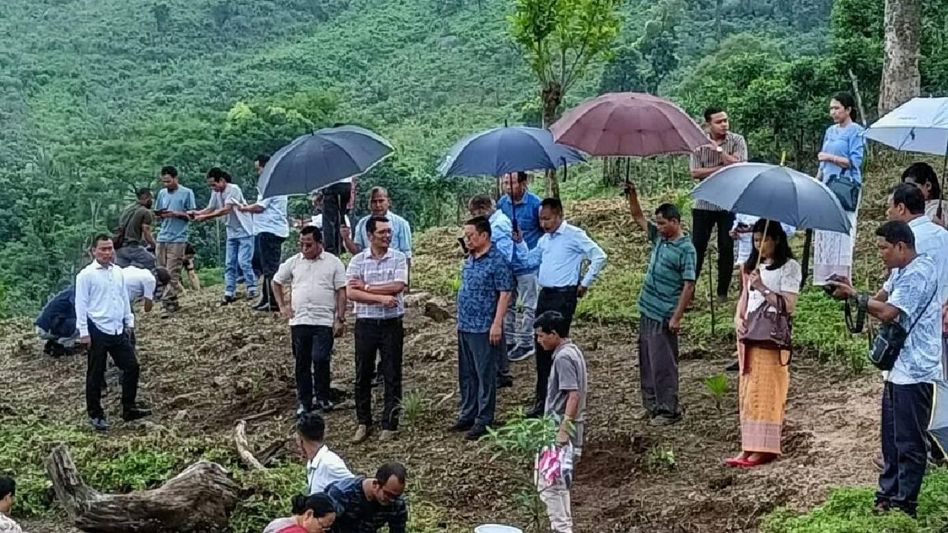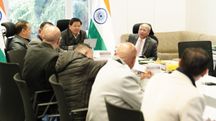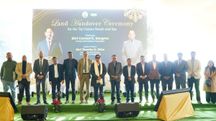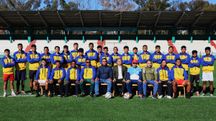Meghalaya Speaker launches SALT project in Garo Hills
This pilot project is being implemented in the villages of Baldinggre, Dura Kalakgre and Sasatgre in West and East Garo Hills districts and will be implemented in other areas in future.
 Meghalaya Speaker Thomas A Sangma
Meghalaya Speaker Thomas A SangmaMeghalaya Speaker, Thomas A Sangma launched the Sloping Agriculture Land Technology (SALT) Project at Sasatgre on the foothills of Nokrek Biosphere Reserve on July 7.
Minister for Soil and Water Conservation, Government of Meghalaya Marcuise N Marak, other dignitaries, District Officials, and people of the area were also present during the launch ceremony.
This pilot project is being implemented in the villages of Baldinggre, Dura Kalakgre, and Sasatgre in the West and East Garo Hills districts and will be implemented in other areas in the future.
Informing about the importance of the acronym, Meghalaya Speaker, Thomas A Sangma said that the acronym SALT is appealing and was wondering what kind of SALT project it was, but after knowing it, the project seemed important and necessary to prevent soil erosion and add fertility to the soil.
Mentioning that Meghalaya state has the World’s heaviest rainfall in the world but this huge amount of water does not retain in the soil and flows to the neighbouring Assam and about 80 percent to Bangladesh.
''It is necessary to retain this water for using during dry season, etc adding that this year there is late and less rainfall and have been experiencing unusual climate change in the region,'' he added.
He also mentioned that along with the flow of water, the top fertile soil among others flows away and hence the cultivable land of the area becomes less productive which is being experienced these days.
''Therefore, this SALT project is aimed to help water retention as well as to prevent soil erosion and add fertility to the soil especially in the hill slopes and in the abandoned jhum cultivation areas. In order to make the soil fertile nitrogen fixation is necessary and a plant that fixes nitrogen will be planted along these slopes where agriculture and allied activities will be practiced along these slopes,'' he said.
Stating that the government and the district officials have been initiating and implementing different important projects for the benefit of the people, he said. ''People should be willing to support and cooperate with these projects and expressed hope that these projects will definitely help to increase production of fruits and vegetables and thereby uplift the economy of the rural people of the region''.
Meanwhile, the Minister for Soil and Water Conservation, Government of Meghalaya Marcuise N Marak shared the present context of drastic climate change where we are experiencing global warming, and imbalance environmental concerns in the area and everywhere and therefore, he said that we need to change our ways and system of life in order to protect and preserve our environment for the future generation.
Mentioning the disadvantages of Jhum cultivation, he said, ''The practice of clearing the trees and surrounding environment is harmful to nature and adopting the new Sloping Agriculture Land Technology (SALT) project is a welcome step and advised the people to support and implement the project for better agricultural production and enhanced livelihood in the area. Reminding that the Nokrek Biosphere Reserve is the source of the main rivers of the Garo Hills region.''
He also urged everyone to lend a helping hand in preserving the water sources as well as the surrounding environment.
In his keynote address, the Divisional Officer, Tura Soil and Water Conservation (T) Division Charseng Marak informed that the Sloping Agriculture Land Technology (SALT) project is a kind of technology especially used in hilly areas to retain the fertility of the soil and prevent soil erosion. In this technology, hedge rows will be planted to prevent the draining of fertile soil and nitrogen fixation plants will be planted which will be trimmed in low heights and the leaves would be thrown on the ground to make the soil fertile.
''This project would also be applied for paddy cultivation and cultivation of squash in the first phase and would be expanded to other areas later,'' he added.
Copyright©2025 Living Media India Limited. For reprint rights: Syndications Today









